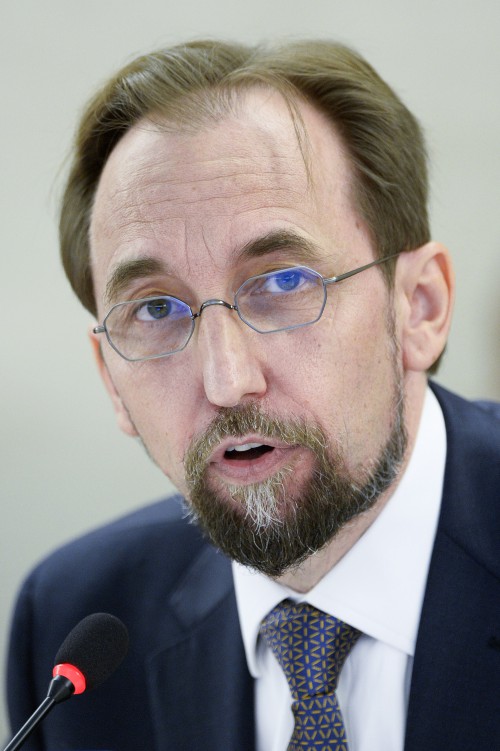15th September 2014 Geneva, Switzerland
Universality under attack
For those of you who may have noticed me looking a little down in the mouth last week, this had little to do with work and almost everything to do with the temporary disappearance of our pet cat. She was obviously not getting enough attention having to compete in our household with two small children as well as the start of the Council session. I am not sure if it was a desperate attempt to get noticed or if she accidentally got locked inside a coal shed, but I’m happy to report she has now returned to the family fold.

The September Council got off to a rousing start with the first statement by new High Commissioner Zeid Ra’ad al Hussein. It was the most powerful opening address by an incoming High Commissioner that I can remember, and I’ve been there for four of them. It focused on the current crises in many countries with a strong emphasis on the need to combat impunity and hold perpetrators of violations to account, wherever they occur. But it was Zeid’s compelling comments about his own experiences in the former Yugoslavia that most clearly came from the heart. He said this had taught him that “violence at the extreme is so callous, so sickening and beyond the absurd, the human mind can barely edit into comprehensible thoughts what it sees”. And that ” there is no justification ever, for the degrading, the debasing or the exploitation of other human beings – on whatever basis: nationality, race, ethnicity, religion, gender, sexual orientation, disability, age or caste.”
It was a fitting tone to set at the start of this session and, regrettably, a much needed reminder of the fact that human rights are universal. By now, more than 65 years after the Universal Declaration of Human Rights, the idea of universality ought to be so deeply embodied within the DNA of anyone working on human rights that this should not need saying. Ever. Nevertheless, challenges to universality seem to be gaining ground. There has always been a lingering academic objection to the concept of universality by those arguing cultural relativism. But of late the idea that human rights are western-imposed values seems to be gaining force in the corridor chatter of the Council, including by diplomats who should know better. I’ve met human rights defenders and their family members from all over the world in the last decade, some of whom have since been arbitrarily detained, tortured and even killed. Not one has ever told me that they don’t believe they have rights because they don’t come from the west. The suggestion that human rights is a western concept is a fiction peddled by those seeking to justify repression of the most vulnerable people in their society on the grounds that universally recognised concepts don’t apply to them.
So the announcement by Brazil, Colombia, Chile and Uruguay on the Council’s opening day that they would run a resolution addressing violence and discrimination on the grounds of sexual orientation and gender identity came as a welcome boost. The idea that no one should be subject to violence or discrimination goes to the heart of universality. It remains to be see whether the resolution will get more support than the last resolution on this topic in 2011, when 23 Council members voted in favour, but let’s hope so.
Just as worrying as the attacks on universality have been recent moves by repressive regimes around the world to clamp down on the activities of human rights defenders and other civil society organisations. Again, High Commissioner Zeid’s comments on Monday were bang on message. In looking at why the worst human rights crises occur he spoke out against leaders who oppress or attack independent actors of civil society. It is therefore regrettable that the resolution on civil society space being led by Ireland is facing such a challenge by a range of Council spoilers. The text responds to a rise in attacks and threats against civil society in many countries as well as recent moves by some states to control activities of civil society organisations by restricting their access to funding.
Those who have been to the discussions on the resolution will know that the pace has been glacial. It feels like a teach-in session on how to filibuster at a convention for malevolent sloths. Almost every paragraph is being debated at length including basic ideas like a call on states to avoid attacks on civil society, and to hold people to account if attacks do occur. Many of the arguments being used to question the resolution are entirely spurious and ought to have no place at the Council.
The rest of the Council session looks set to be intense so it came as a welcome respite that week one of the Council had a public holiday in it. In this era of obsessive compulsive use of smartphones, I’m sure that no Council goer had a clean break from work. But at least we got to spend some time in the physical vicinity of our neglected family and friends. And pets.
Teaching malevolent sloths how to filibuster: spot-on analysis of #HRC27 to date by #BobLast of @UKmissionGeneva https://twitter.com/IneichenM/status/512309240095330305
Great analysis as usual Bob! The issue of universality has truly become one of the main subjects being discussed this session.
Great blog! Wish I was back at the Council.